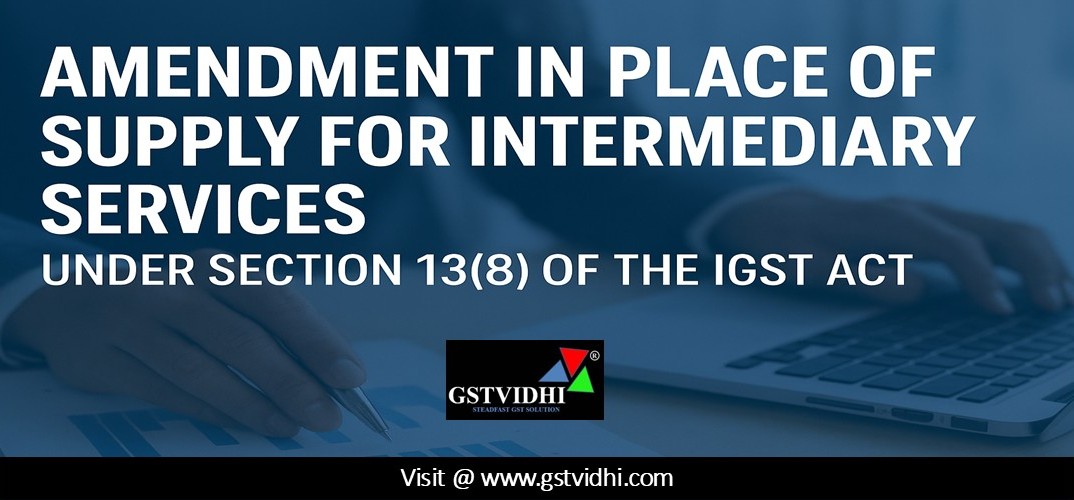
Amendment in Place of Supply for Intermediary Services under the
IGST Act – Impact and Analysis
Introduction
The Goods and Services
Tax (GST) regime has always emphasized the principle of destination-based
taxation. However, one of the most debated provisions in the IGST Act, 2017,
was the place of supply rule for “intermediary services” under Section
13(8)(b). Under this provision, the place of supply for intermediary
services was deemed to be the location of the supplier, irrespective of
the location of the recipient. This created significant hurdles for Indian
service providers acting as intermediaries in cross-border transactions, as
their services were treated as taxable in India and denied the benefits of
being considered as exports.
In the 56th GST
Council Meeting held on 3rd September 2025, the Council recommended a
crucial amendment by omitting clause (b) of Section 13(8). This change
marks a turning point for Indian intermediaries, particularly those engaged in
facilitating international trade and services.
Previous
Provision – Section 13(8)(b) of the IGST Act
Before the amendment,
Section 13(8) specified certain services where the place of supply would be the
location of the supplier, regardless of the general rule under Section
13(2). Among these, clause (b) covered intermediary services, meaning:
- Even if the recipient was located
outside India, the place of supply was deemed to be in India.
- Such services were treated as
domestic supplies and not exports.
- Export-related benefits like
zero-rating and refund of input tax credit were denied.
This position led to
widespread litigation and grievances among exporters, especially education
consultants, marketing agents, BPOs, and similar businesses.
The
Amendment – Omission of Section 13(8)(b)
The GST Council,
acknowledging industry concerns, recommended the deletion of clause (b) of
Section 13(8). As a result:
- The place of supply for intermediary
services will now be determined under Section 13(2) (the default
rule).
- Accordingly, if the recipient of
services is located outside India, the place of supply will also be
considered outside India.
- Such supplies will now qualify as exports
of services provided other export conditions under GST law are
fulfilled.
Impact of
the Amendment
1. Relief to Indian
Service Providers
Indian intermediaries
will no longer be taxed in India when providing services to recipients located
abroad. This ensures that their services are treated as exports, eligible for
zero-rated benefits.
2. Boost to Export
Competitiveness
With GST no longer being
a cost component, Indian intermediaries can now compete more effectively in
global markets. This especially benefits consultancy services, marketing
support services, and international educational advisors.
3. Reduction in
Litigation
The omission addresses
long-pending disputes where taxpayers challenged the constitutional validity of
Section 13(8)(b). With this amendment, such litigation is likely to reduce,
easing the burden on both taxpayers and courts.
4. Clarity in Taxation
Framework
By aligning with the
principle of destination-based consumption, the GST framework now becomes more
consistent and transparent. This move also brings India’s tax regime closer to
international VAT/GST practices.
5. Indirect Benefit to
Students and Professionals
Industries like foreign
education consultancy, which were earlier taxed in India despite serving
foreign institutions, will now be able to treat such services as exports. This
indirectly reduces costs for Indian students aspiring to study abroad.
Conclusion
The removal of Section
13(8)(b) of the IGST Act is a landmark reform in the GST framework. It
resolves a long-standing anomaly where Indian intermediaries were unfairly
taxed on services provided to foreign clients. With this change, such services
will now fall under the general rule of Section 13(2), thereby treating them as
exports when recipients are located outside India.
This amendment not only
boosts India’s service export sector but also enhances the ease of doing
business and aligns the GST law with its intended philosophy of
destination-based taxation. The move is expected to provide much-needed relief
to thousands of businesses and professionals while strengthening India’s
position in the global services market.
Disclaimer: All the Information is based on the notification, circular advisory and order issued by the Govt. authority and judgement delivered by the court or the authority information is strictly for educational purposes and on the basis of our best understanding of laws & not binding on anyone.
Click here